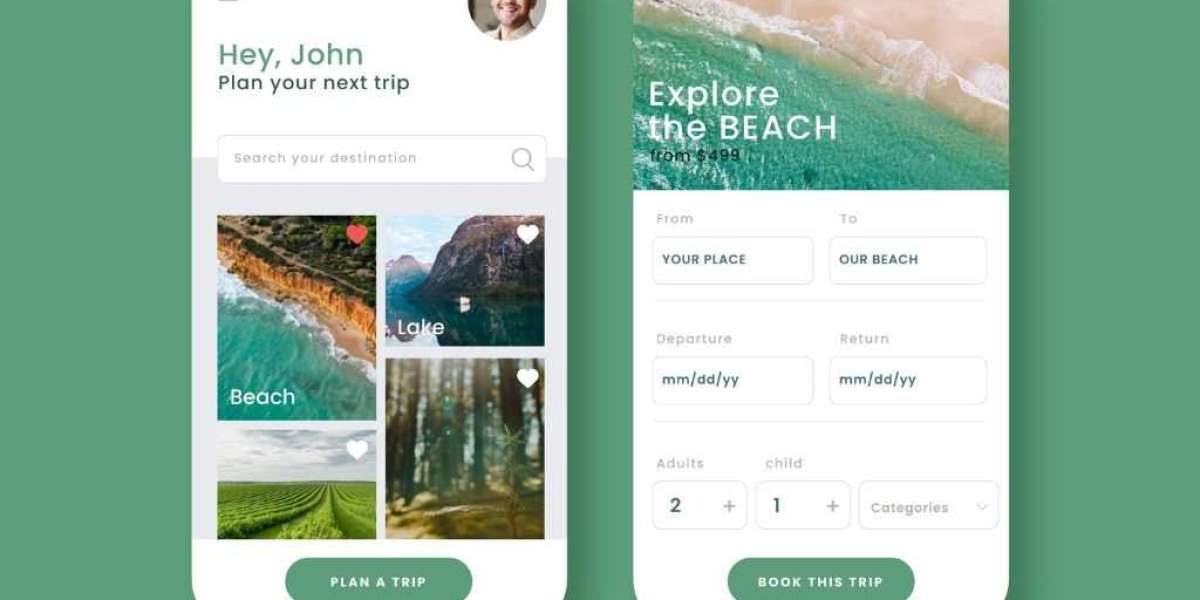The vacation rental market has seen tremendous growth in recent years as more travelers are opting for home-sharing over hotels. Apps like Airbnb, VRBO and HomeAway have enabled millions of people to list, discover and book unique homes and experiences around the world.
With demand for vacation rentals soaring, new entrants continue entering this booming market with their own vacation rental platforms. However, building a successful vacation rental app is no easy feat and requires thorough planning and research to address various challenges.
This blog outlines 13 critical things you need to understand before starting your own vacation rental app. By assessing these aspects adequately in the early stages, you can develop a strong foundation for your platform and improve its chances of success.
1. Conduct Thorough Market Research
Analyzing the existing short-term rental market landscape will help you gauge the opportunities and gaps. Start by researching:
Market leaders: Conduct in-depth analysis of Airbnb, VRBO and other dominant players. Understand their features, functionality, growth strategies and what's driving their success.
Growth trends: Research current and projected growth of the global short-term rental market. Identify key target regions, cities and property types experiencing high demand. The US and European markets currently lead but Asia-Pacific is growing rapidly.
Competition: Map all major and niche vacation rental platforms operating in your targeted regions. Analyze their value propositions, strengths and weaknesses to identify potential opportunities.
Customer needs: Understand what travelers and hosts want from a vacation rental platform through surveys, interviews and reviews analysis. Key aspects include seamless booking, payment processes, host/guest reviews and communication tools.
Thorough market research upfront will help you spot opportunities, understand customer and industry pain points and position your platform competitively. Allocate at least 2 months for this crucial initial phase.
2. Decide on Tech Stack and Core Functionality
With market research complete, define the core features and products you want to offer on your platform. Some key aspects to focus on include:
Listing/booking flow: Design smooth listing creation and seamless booking workflows for guests on both mobile and web. Consider different property types like entire homes, private rooms, vacation homes etc.
Payments: Integrate secure payment solutions like PayPal that support global payments in different currencies. Allow payments from guests as well as payouts to hosts.
Reviews: Build a robust host and guest review system that drives trust and helps users make informed decisions.
Host dashboard: Create an intuitive host dashboard accessible via mobile/web for listing management, bookings, reviews, analytics etc.
Guest tools: Guest tools for travel inspiration, image galleries, maps, things to do around listings etc. can enhance the search and discovery experience.
With key features outlined, choose the most suitable tech stack and platform (iOS, Android or Web based). Allow 2-3 months for initial app development based on feature prioritization. Checkout Zipprr https://zipprr.com/airbnb-clone/
3. Comply with Regulations
Familiarize yourself with the legal framework and regulations governing short-term rentals across destinations where you plan operations. Key areas to research include:
Licensing: Some cities and regions require special business licenses, permits or tax registrations for listing properties on rental platforms. Ensure you comply with local laws.
Restrictions: Certain locales place caps on the number of nights a host can rent their property or have zoning restrictions. Understand any applicable rules.
Taxes: You'll need to collect relevant taxes like hotel occupancy tax or tourist tax from guests and remit this to local authorities based on regulations.
Liability and insurance: Hosts may require general liability insurance coverage. Build features ensuring safety compliance and to tackle illegal listings.
Privacy: Adhere to privacy laws when collecting and storing guest/host data across regions. Obtain necessary consents.
Stay updated on policy changes too. Non-compliance can attract hefty penalties, so legal vetting is critical when expanding globally. Budget 3-6 months for this upfront.
4. Develop a Listing Acquisition Strategy
Listing inventory is essential for any vacation rental platform. To attract hosts, develop a multi-pronged acquisition strategy including:
Partnerships: Collaborate with property managers, real estate agents and homeowner associations for access to their rental listings.
Incentives: Offer sign-up bonuses, referral programs, high placement in search to incentivize early hosts. Consider a revenue share model too.
Sales team: Hire dedicated account managers focused on signing exclusive listing agreements with entire apartment buildings, resorts.
Marketing: Leverage PR, influencer marketing, events to raise platform awareness among potential hosts. Highlight payout reliability and large bookable guest base.
Host on-boarding: Provide smooth sign-up flows and tutorials guiding new hosts through listing setup and management.
Launch pilot programs in select cities and iterate based on learnings. Budget 6-12 months solely for this initiative to kickstart your network effects.
5. Prioritize Superior Customer Support
Exceptional 24/7 support across channels builds trust with users from day one. Develop a strong customer support system:
Multi-channel support: Offer phone, email, live chat support catering to different user preferences. Build a customer support portal/app.
Agents: Hire and train dedicated customer support representatives versed in your product and regulations.
Automation: Implement knowledge base, IVR and other automated solutions to handle common queries.
Responsiveness: Aim for replies within an hour on all channels. Resolve issues promptly to ensure high satisfaction.
Proactive support: Monitor social media, reviews for complaints. Proactively contact users for feedback post-stay.
Escalation matrix: Have an escalation process in place direct highly complex cases to senior representatives.
Customer happiness should be a top priority. Budget at least 10% of initial funding for customer support capacity building.
6. Integrate Secure Payment Solutions
Payment processing is inherently risky given the involved monetary transactions. Partner with proven payment gateways supporting:
Global acceptance: Major international cards and alternative payment methods popular worldwide like PayPal.
Multi-currency: Natively supporting payments in different currencies for an international user base.
PCI compliance: Adhere to Payment Card Industry Data Security Standard for securing card data.
Local payment options: Integrate popular local payment methods in target international markets.
Auto-reconciliation: Effortless payouts to hosts and refund handling in case of cancellations.
Dispute resolution: Ability to address chargeback disputes adequately.
Setup fees: Compare payment processor fees, especially percentagnge taken per transaction.
Dedicate 3-6 months purely for payment setup to pass required certifications on time. Prioritize security while retaining seamless user experience.
7. Build Robust Host Tools
Hosts are your backbone - empower them with easy-to-use professionally designed tools for effortless property management:
Listing management: Intuitive dashboard for creating detailed listings with maps, photos, amenities etc.
Calendar: Color-coded calendar displaying bookings, blocks, availability in a glance.
Bookings: Comprehensive view of upcoming, past, pending bookings with guest details.
Messaging: Built-in messaging system enabling hosts to contact guests needing assistance.
Reviews: Access to guest reviews and ability to manage response.
Analytics: Insights on booking trends, seasons, top listing performers for optimization.
Payouts: Seamless payout scheduling and transaction history.
Notifications: Push updates on new booking requests, messages, payments etc.
Superb host experience translates to expanded supply of high-quality accommodations.
8. Drive Travel Inspiration and Discovery
Beyond just listings, users want an exploration experience. Enhance discovery through:
Curated lists: City guides, seasonal itineraries and recommended neighborhood collections.
Destinations content: Embed travel stories, videos, photos from key locations worldwide.
Maps: Interactive mapping of listings integrated with points of interest (POIs) nearby.
Things to do: Directory of top-rated attractions, tours, restaurants within a certain distance from each listing.
Itineraries: Build sample 1-day, 3-day custom itineraries based on user interests and listing location.
Events calendar: Browse local events, festivals throughout the year that could inspire trips.
Well-thought experiential features amplify the vacations vision and bring more eyeballs to your platform.
9. Develop Robust Review System
Consider these factors while designing your review functionality:
User verification: Ensure only verified guests/hosts can leave reviews to curb fake ratings.
Anonymity: Allow anonymous reviews but reveal identities to the host/guest being reviewed.
Dimensions: Rating categories should revolve around location, cleanliness, communication, check-in etc. for actionable feedback.
10. Manage Disputes and Issues Effectively
Inevitably issues will arise between users that require attention. Establish:
Complaint escalation: A process through which users can flag serious complaints so your team can investigate promptly.
Damage claims: A standard procedure for hosts to report property damage and claim appropriate reimbursement or deposit withholding if necessary.
Mediation: For non-criminal conflicts, offer online mediation tools or connect disputing parties over call to resolve amicably before reaching a verdict.
Banning policy: Explicit terms for removing irresponsible users from the platform after multiple violations to maintain community standards.
Build trust by resolving problems fairly while learning from user experience data to enhance policies over time.
11. Optimize Distribution and Discovery
Listings found easily through various touchpoints stand a higher chance of bookings. Explore:
Meta-search partnerships: Provide your inventory as an aggregator to powerful meta-search sites like Expedia, Trivago and Google Hotel Ads.
Travel agency tie-ups: Collaborate with inbound tour operators and travel agents bringing international visitors.
Direct connect: Regular campaigns featuring your hosts and listings directly on booking platforms, OTA newsletters, travel blogs and magazines.
Social media: Promote viral hashtag challenges, listings on platforms like Instagram, Facebook with travel influencers.
SEO: Optimize website, listings and content for relevant keywords and geotags to aid discovery organically.
A multichannel distribution approach extends your reach beyond your domain.
12. Ensure Reservations and Availability Accuracy
Implement these capabilities for reliable reservations:
Instant booking: Allow guests immediate booking confirmation subject to availabile dates on the calendar.
Real-time sync: Calendar auto-updates when an enquiry is made or booking is confirmed from any platform/device.
Blocking dates: Option for hosts to mark selective dates as unavailable or bookable on request only.
Blackout dates: Define host-set blackout periods annually or as needed when cleaning, repairs underway.
Overbooking avoidance: System checks for double bookings to prevent such mishaps leading to poor reviews.
Calendar views: Search, weekly, monthly calendar formats as preferred by different user types.
Accuracy and transparency builds trust in your booking service.
13. Prioritize Trust and Security
Security concerns if not addressed can jeopardize your brand's reputation:
Identity verification: Certified profile verification for all users through ID/docs matching and possibly video verification.
Background checks: Screen hosts and properties with criminal background checks especially in neighborhoods alongside reviews.
Safe neighborhood badges: Designations for listings located in safer, well-lit areas vis-à-vis high crime zones for guest insight and filtering.
Insurance coverage: Liability coverage for hosts as well as cyber insurance to cover risks of security/payment breaches.
Privacy policy: Strict user privacy policy and data security compliances like encryption at rest, SSL etc.
Fraud detection: Monitoring algorithms that flag abnormal account/review patterns needing manual scrutiny to curb fake/compromised accounts.
Earning customers' security-centric trust is non-negotiable.
Conclusion
Building a successful vacation rental platform is no easy feat but with thorough planning on the above crucial aspects and continuous improvement, your startup stands a fair chance at achieving scale. Market research, product-market fit, customer centricity, security should remain your guiding principles. I hope this article provides you clarity on what it takes to launch your travel hosting venture. All the best with your envisioned vacation rental app!








